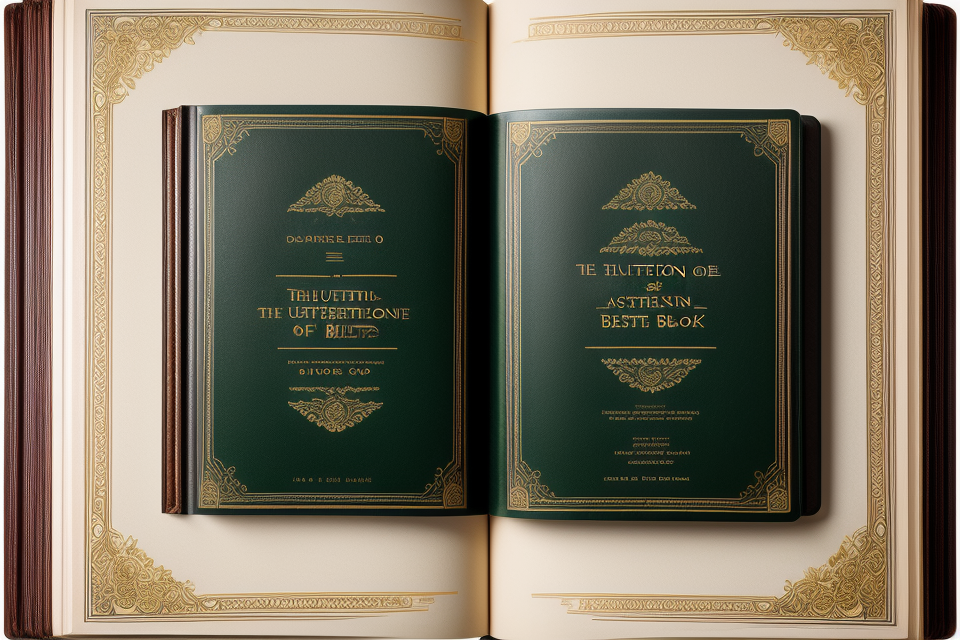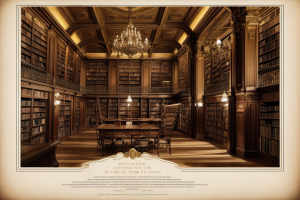
Ah, the question that has puzzled bibliophiles for centuries – what is the best book of all time? It’s a debate that has sparked countless arguments and endless discussions, with literature lovers worldwide championing their favorite novels. From classic tales of adventure and romance to modern masterpieces that challenge the status quo, the list of contenders is extensive. But amidst the sea of words, which book stands out as the ultimate winner? In this guide, we’ll delve into the realm of traditional classics and uncover the hidden gems that have stood the test of time. So, join us as we embark on a journey to discover the best book of all time – a tale of love, laughter, and literature that will leave you breathless.
Defining the Best Book of All Time: Traditional Classics
What is a traditional classic?
A traditional classic is a book that has stood the test of time and has become a staple of literary culture. These books are often considered to be of enduring significance and are regarded as having a lasting impact on literature as a whole.
Some examples of traditional classics include:
- Pride and Prejudice by Jane Austen
- To Kill a Mockingbird by Harper Lee
- The Great Gatsby by F. Scott Fitzgerald
- Moby-Dick by Herman Melville
- The Odyssey by Homer
These books are not only beloved by readers, but they have also been studied and analyzed by scholars and literary critics for decades. They continue to be relevant and important in the present day, and are likely to remain so for many years to come.
How is the best book of all time determined?
Determining the best book of all time is a subjective matter and varies from person to person. It is a challenging task to pinpoint one book as the best, as there are countless books that have been written throughout history, each with its unique style, content, and cultural significance. However, certain criteria can be used to evaluate the books that have stood the test of time and have been regarded as classics.
Criteria for determining the best book of all time
One of the most important criteria for determining the best book of all time is its literary merit. A book that has been written with excellence in terms of style, plot, character development, and themes is considered to be a classic. Such books often have a profound impact on readers and are able to evoke emotions and inspire thought long after they have been read.
Another important criterion is the book’s cultural significance. A book that has had a lasting impact on society and has been influential in shaping cultural values, beliefs, and attitudes is considered to be a classic. These books often reflect the societal issues and concerns of their time and continue to be relevant today.
Factors that contribute to a book’s enduring popularity and cultural significance
There are several factors that contribute to a book’s enduring popularity and cultural significance. One of the most important factors is the book’s ability to capture the imagination of readers and transport them to another world. A book that is able to do this is able to create a lasting impact on readers and continues to be read and loved for generations.
Another important factor is the book’s ability to resonate with readers on an emotional level. A book that is able to evoke strong emotions in readers, such as love, joy, sadness, or fear, is able to create a deep connection with readers and continues to be read and loved for generations.
Finally, a book’s cultural significance is also influenced by the time and place in which it was written. A book that was written during a time of significant social, political, or cultural change is often able to capture the spirit of the time and continues to be relevant today. Similarly, a book that was written in a particular cultural context, such as a particular region or era, is often able to capture the essence of that context and continues to be read and loved for generations.
Exploring Traditional Classics: The Most Acclaimed Books
The Great Gatsby by F. Scott Fitzgerald
Overview of the Novel
- The Great Gatsby, published in 1925, is a novel written by F. Scott Fitzgerald.
- Set during the Roaring Twenties, the story is narrated by Nick Carraway, a young man who has just moved to Long Island’s West Egg neighborhood.
- The novel follows the lives of several characters, including Jay Gatsby, a mysterious and wealthy man who throws lavish parties, and Nick’s cousin, Daisy Buchanan.
- Gatsby’s obsession with Daisy drives the plot, as he tries to win her back after years of separation.
Literary Significance and Impact
- The Great Gatsby is widely regarded as a masterpiece of American literature.
- The novel is known for its poetic prose, intricate symbolism, and vivid portrayal of the excesses and superficiality of the Jazz Age.
- Fitzgerald’s use of themes such as the American Dream, social class, and the corrupting influence of wealth has made the novel a staple of high school and college curricula.
Critical Acclaim and Awards
- The Great Gatsby was a commercial failure during Fitzgerald’s lifetime but has since become a critical darling.
- The novel has been praised by numerous writers and critics, including T.S. Eliot, who called it “a first-rate piece of work.”
- In 2010, the novel was awarded the American Book Award by the National Book Foundation, cementing its status as a classic of American literature.
To Kill a Mockingbird by Harper Lee
To Kill a Mockingbird, written by Harper Lee, is a novel that explores the themes of racial injustice, prejudice, and the loss of innocence in a small town in the American South during the 1930s. The story is narrated by Scout Finch, a young girl who learns about the world around her through her experiences and observations. The novel centers around the trial of Tom Robinson, a black man who is falsely accused of raping a white woman, and the impact it has on the community.
To Kill a Mockingbird is widely regarded as a masterpiece of American literature and a classic of modern world literature. The novel has won numerous awards and honors, including the Pulitzer Prize, and has been translated into more than 40 languages. The novel’s themes of racial injustice and prejudice continue to resonate with readers today, making it a relevant and important work.
The novel’s use of the narrative perspective of a young girl also sets it apart from other works of literature. Through Scout’s eyes, readers see the world around her and the events that unfold in a unique and honest way. The novel’s exploration of themes such as racism, prejudice, and injustice also make it a powerful tool for teaching and learning about these important issues.
To Kill a Mockingbird has received widespread critical acclaim since its publication in 1960. It has been included on numerous lists of the best books of the 20th century and is often taught in schools and universities. The novel has also won numerous awards, including the Pulitzer Prize, the National Book Award, and the American Library Association’s Best of the Best list.
Pride and Prejudice by Jane Austen
- Overview of the Novel
Pride and Prejudice, first published in 1813, is a romantic novel by English author Jane Austen. The novel follows the lives of the Bennet sisters, particularly Elizabeth and her eventual relationship with Mr. Darcy. Set in the early 19th century, the story is characterized by wit, social commentary, and romantic intrigue.
- Literary Significance and Impact
Pride and Prejudice is widely regarded as one of Austen’s finest works and a significant contribution to English literature. The novel explores themes such as love, pride, prejudice, and social class, which continue to resonate with readers today.
Austen’s distinctive writing style, which combines irony, sarcasm, and a keen observation of society, has influenced numerous subsequent authors. Her innovative use of free indirect speech, allowing readers to access characters’ thoughts and feelings, has become a hallmark of modern fiction.
- Critical Acclaim and Awards
Pride and Prejudice has been consistently praised by critics and readers alike. It has been adapted numerous times for stage, screen, and other media, further testament to its enduring popularity and cultural significance. The novel has also won several awards, including a spot on the BBC’s list of the 100 greatest British novels of all time.
Other notable traditional classics
While the works of Shakespeare, Jane Austen, and Mark Twain are undoubtedly some of the most well-known and widely acclaimed traditional classics, there are many other books that have made a significant impact on literature and culture. Here are a few examples of other notable traditional classics:
*”Don Quixote” by Miguel de Cervantes
*Published in 1605, “Don Quixote” is considered one of the first modern novels and a pioneering work of the literary genre known as the novel. The story follows the adventures of the titular character, a knight-errant who sets out to right wrongs and defend the honor of his lady love, Dulcinea.
*”Robinson Crusoe” by Daniel Defoe
*Published in 1719, “Robinson Crusoe” is a classic adventure story that has inspired countless imitators and adaptations. The novel follows the eponymous character, a young man who becomes shipwrecked and finds himself stranded on a deserted island for many years.
*”Gulliver’s Travels” by Jonathan Swift
*Published in 1726, “Gulliver’s Travels” is a satirical novel that tells the story of Lemuel Gulliver, a surgeon who travels to several fantastical lands and encounters a variety of strange and bizarre creatures. The novel is a commentary on the political and social issues of the time, and is known for its wit and humor.
*”The Three Musketeers” by Alexandre Dumas
*Published in 1844, “The Three Musketeers” is a classic adventure story that follows the adventures of a young man named d’Artagnan as he joins the musketeers, a group of soldiers who are tasked with protecting the king of France. The novel is known for its fast-paced action, memorable characters, and historical accuracy.
These are just a few examples of the many traditional classics that have made a lasting impact on literature and culture. Whether you’re a fan of adventure stories, satire, or romance, there is a traditional classic out there that is sure to capture your imagination.
Factors That Contribute to a Book’s Enduring Popularity and Cultural Significance
Historical context
- How historical events and cultural shifts have influenced the enduring popularity of certain books
- Examples of books that have been impacted by historical context
Historical context plays a significant role in shaping the enduring popularity and cultural significance of certain books. Books that are written during times of great change or upheaval often resonate with readers because they offer insight into the human experience during those periods. In addition, the cultural values and beliefs of a particular era can influence the books that are considered classics and continue to be read and studied long after they were written.
One example of a book that has been impacted by historical context is “Pride and Prejudice” by Jane Austen. This novel was written during the Regency period in England, a time of great social and economic change. The novel’s exploration of love, marriage, and class dynamics resonated with readers during this time and continues to be relevant today. Similarly, “Moby-Dick” by Herman Melville was written during a time of great interest in whaling and exploration, and its themes of obsession and the search for meaning continue to resonate with readers today.
In conclusion, historical context plays a crucial role in shaping the enduring popularity and cultural significance of certain books. Books that are written during times of great change or upheaval often resonate with readers because they offer insight into the human experience during those periods. Additionally, the cultural values and beliefs of a particular era can influence the books that are considered classics and continue to be read and studied long after they were written.
Themes and universal human experiences
One of the key factors that contribute to a book’s enduring popularity and cultural significance is its exploration of universal human experiences. These are themes that are relevant to readers across generations and cultures, and continue to resonate with readers today. In this section, we will explore how books that explore universal human experiences continue to be beloved by readers, and provide examples of such books.
- The power of empathy: Books that explore universal human experiences allow readers to connect with the characters and their struggles, fostering empathy and understanding. By seeing themselves in the characters, readers are able to gain insight into their own lives and the lives of others.
- Exploration of the human condition: Books that delve into universal human experiences provide readers with a deeper understanding of the human condition. They help readers make sense of the world around them and their own lives, and can offer comfort and solace in times of struggle.
- Enduring relevance: Universal human experiences are timeless, and the themes explored in these books continue to be relevant today. They provide a lens through which readers can view their own lives and the world around them, and can offer valuable insights and perspectives.
Examples of books that explore themes of love, loss, identity, and more:
- To Kill a Mockingbird by Harper Lee: This classic novel explores themes of racism, injustice, and the loss of innocence, and continues to be a beloved and relevant read for readers today.
- The Great Gatsby by F. Scott Fitzgerald: This novel is a classic exploration of the American Dream, and the themes of love, ambition, and identity continue to resonate with readers today.
- The Catcher in the Rye by J.D. Salinger: This novel is a coming-of-age story that explores themes of identity, alienation, and the struggle to find one’s place in the world.
- The Odyssey by Homer: This epic poem explores themes of love, loyalty, and the human desire for adventure and exploration, and continues to be a beloved and influential work of literature.
- Pride and Prejudice by Jane Austen: This classic novel explores themes of love, marriage, and social class, and continues to be a beloved and relevant read for readers today.
The power of storytelling
The art of storytelling has played a crucial role in the enduring popularity of many books. It is the ability to captivate readers with a narrative that transports them to another world, introduces them to complex characters, and invites them to explore universal themes and ideas. In this section, we will examine how storytelling has contributed to the cultural significance of certain books and provide examples of books that have captivated readers through their narrative prowess.
- The Role of Emotional Connection: One of the primary ways in which storytelling contributes to a book’s enduring popularity is by fostering an emotional connection between the reader and the story. This connection can be established through relatable characters, compelling plotlines, and vivid descriptions that evoke powerful emotions. When readers become emotionally invested in a story, they are more likely to remember it and recommend it to others.
- The Power of Imagination: Another way in which storytelling contributes to a book’s cultural significance is by unlocking the power of imagination. A well-crafted narrative can transport readers to new worlds, introduce them to unfamiliar cultures, and inspire them to explore their own creativity. This imaginative quality of storytelling has led to the creation of countless memorable works of literature that continue to captivate readers across generations.
- The Importance of Universal Themes: Yet another factor that contributes to a book’s enduring popularity through storytelling is its ability to explore universal themes and ideas. Books that tackle timeless issues such as love, loss, family, and identity have a tendency to resonate with readers on a deep level. When a story speaks to the human experience in a profound way, it has the potential to become a cultural touchstone that transcends time and place.
Examples of books that have captivated readers through their storytelling prowess include:
- To Kill a Mockingbird by Harper Lee: This classic novel tells the story of a young girl growing up in the Deep South during the 1930s. Through the eyes of Scout Finch, readers are introduced to the complexities of race, class, and justice in a way that resonates with people of all ages and backgrounds.
- The Great Gatsby by F. Scott Fitzgerald: This iconic novel explores the decadence and excess of the Roaring Twenties through the eyes of Jay Gatsby, a mysterious and enigmatic figure who embodies the American Dream. Fitzgerald’s masterful storytelling and poetic prose have made this book a staple of American literature.
- The Catcher in the Rye by J.D. Salinger: This groundbreaking novel follows the journey of Holden Caulfield, a disillusioned teenager struggling to find his place in the world. Salinger’s ability to capture the voice and emotions of a young man on the brink of adulthood has made this book a perennial favorite among teenagers and adults alike.
Overall, the power of storytelling has played a critical role in the enduring popularity and cultural significance of many traditional classics. Through emotional connection, imagination, and exploration of universal themes, these books continue to captivate readers and inspire new generations of readers.
The Impact of Technology on the Definition of the Best Book of All Time
How technology has changed the way we read and access books
The rise of e-books and audiobooks
E-books and audiobooks have revolutionized the way we read by providing a more convenient and accessible way to consume books. E-books, in particular, have become increasingly popular due to their ability to be downloaded instantly and read on a variety of devices, including smartphones, tablets, and e-readers. This has made it easier for readers to access a wider range of books, as they no longer need to physically carry books with them or wait for them to be delivered.
Audiobooks, on the other hand, have provided a new way for people to “read” books who may have difficulty with traditional reading, such as those with visual impairments or those who are physically unable to hold a book. The popularity of audiobooks has also led to an increase in the number of titles available, as well as the development of new technologies for producing and distributing them.
The impact of online bookstores and social media on book discovery
Online bookstores, such as Amazon and Barnes & Noble, have transformed the way we discover and purchase books. These websites allow readers to easily browse a vast selection of books, read reviews, and purchase titles with just a few clicks. In addition, online bookstores often provide personalized recommendations based on a customer’s reading history, making it easier for readers to find new books that they may enjoy.
Social media has also played a significant role in book discovery, as readers can share their favorite books and recommend new titles to their followers. This has created a community of book lovers who can share their thoughts and discover new books through social media platforms such as Twitter, Instagram, and Goodreads. In addition, social media has allowed authors and publishers to connect directly with readers, creating new opportunities for promotion and marketing.
The changing definition of the best book of all time
- With the advent of technology, the definition of the best book of all time has become increasingly subjective and diverse.
- The rise of digital platforms has led to a democratization of literature, with a wider range of voices and genres being represented in the modern literary canon.
- This has resulted in a more inclusive and diverse understanding of what constitutes the best book of all time, as readers are exposed to a wider range of perspectives and styles.
- However, this also means that the concept of the best book of all time has become more difficult to define, as there are now more options and opinions to consider.
- Additionally, the ease of access to information and the ability to instantly compare different books has made it easier for readers to form their own opinions and make informed decisions about what constitutes the best book of all time for them personally.
- The rise of e-books and audiobooks has also changed the way people consume literature, making it more convenient and accessible for readers to access a wide range of books.
- The availability of online book reviews and recommendations has also made it easier for readers to discover new books and authors, further expanding the definition of the best book of all time.
- In conclusion, the changing definition of the best book of all time reflects the evolving role of technology in shaping the way we read, discover and understand literature.
The Future of the Best Book of All Time
How new technologies and platforms will continue to shape the literary landscape
The impact of emerging technologies on the way we read and engage with books
- The rise of e-books and audiobooks, and how they have changed the way we consume literature
- The impact of social media and online communities on the discovery and discussion of books
- The development of virtual and augmented reality technologies, and their potential to enhance the reading experience
The potential for new voices and perspectives to emerge in the literary world
- The democratization of publishing through self-publishing platforms and digital publishing houses
- The growth of diverse voices and genres in the literary world, including #OwnVoices and speculative fiction
- The potential for new forms of storytelling and literary experimentation enabled by new technologies
Overall, the impact of new technologies and platforms on the literary landscape is complex and multifaceted. While there are concerns about the potential loss of traditional forms of publishing and the potential for misinformation and bias in online communities, there is also the potential for greater accessibility, diversity, and innovation in the world of literature. As technology continues to evolve, it will be interesting to see how these trends develop and shape the future of the best book of all time.
The enduring appeal of traditional classics in a digital age
Despite the abundance of new books and technological advancements, traditional classics continue to captivate readers in the digital age. The enduring appeal of these works can be attributed to several factors, including their timeless themes, the nostalgia they evoke, and the comfort they provide in times of uncertainty.
- Timeless Themes: One of the primary reasons traditional classics remain relevant is that they often explore themes that are universal and timeless. These works tackle topics such as love, loss, human nature, and the search for meaning, which continue to resonate with readers regardless of the era in which they live. The enduring relevance of these themes ensures that traditional classics remain a rich source of insight and inspiration for contemporary readers.
- Nostalgia and Tradition: Another factor contributing to the enduring appeal of traditional classics is the sense of nostalgia and tradition they evoke. Many readers find comfort in the familiarity of these works, which have been passed down through generations. The familiarity of these stories can create a sense of connection to the past, providing readers with a sense of continuity and stability in an ever-changing world.
- Comfort in Uncertainty: In times of uncertainty, readers often turn to traditional classics for comfort and solace. These works can provide a sense of familiarity and predictability, offering readers a temporary escape from the challenges of the present. Additionally, the literary devices and storytelling techniques employed in traditional classics can offer insight into the human condition, helping readers make sense of their own experiences and emotions.
In conclusion, the enduring appeal of traditional classics in a digital age can be attributed to their timeless themes, the nostalgia and tradition they evoke, and the comfort they provide in times of uncertainty. These works continue to captivate readers, proving that the best books of all time are not confined to a specific era or medium.
The future of the best book of all time
The future of the best book of all time is a topic of much debate among literary scholars and enthusiasts alike. As technology continues to advance and cultural norms shift, it is difficult to predict what the literary canon of the future will look like. However, there are several trends and predictions that can provide insight into what the future may hold.
One trend that is likely to continue is the increasing importance of digital media in the literary world. With the rise of e-books and audiobooks, more and more readers are choosing to consume literature in digital formats. This shift towards digital media is likely to continue, and may even accelerate in the coming years. As a result, it is possible that the traditional physical book may become a niche product, catering to a smaller audience of readers who prefer the tactile experience of holding a physical book.
Another trend that is likely to shape the future of the best book of all time is the growing diversity of voices in literature. As more and more marginalized voices are given a platform, the literary canon is becoming more inclusive and representative of the diverse tapestry of human experience. This trend is likely to continue, as readers increasingly demand stories that reflect their own experiences and perspectives. As a result, the best book of all time may come to be defined by its ability to speak to a wide range of readers, rather than by its status as a “classic” work.
In addition to these trends, there are several other factors that may shape the future of the best book of all time. For example, the increasing globalization of literature may lead to a greater diversity of works being recognized as “classics” in different parts of the world. Additionally, changing attitudes towards reading and the role of literature in society may lead to a redefinition of what it means for a book to be considered the “best” of all time.
Overall, the future of the best book of all time is likely to be shaped by a complex interplay of technological, cultural, and societal factors. While it is impossible to predict exactly what the literary canon of the future will look like, it is clear that the best book of all time will continue to evolve and adapt to changing times.
FAQs
1. What is considered the best book of all time?
Answer: It is a question that has been debated by readers and scholars for centuries, and there is no definitive answer. However, many people consider the Bible to be the best book of all time due to its historical and cultural significance, as well as its impact on humanity.
2. What are some traditional classics that are considered the best books of all time?
Answer: There are many traditional classics that are considered the best books of all time, including works by William Shakespeare, Jane Austen, and Charles Dickens. Other examples include “To Kill a Mockingbird” by Harper Lee, “The Great Gatsby” by F. Scott Fitzgerald, and “The Catcher in the Rye” by J.D. Salinger.
3. What makes a book a traditional classic?
Answer: A traditional classic is a book that has stood the test of time and is considered a classic of its genre. These books often have timeless themes and characters that continue to resonate with readers today. They may also have historical or cultural significance, and have been widely read and studied for many years.
4. How can I determine which traditional classic book is the best for me to read?
Answer: There are many factors to consider when choosing a traditional classic book to read, including your personal interests and preferences, as well as the themes and topics covered in the book. It may be helpful to read reviews or ask for recommendations from friends or literary experts to help you make a decision. Ultimately, the best book for you will depend on your individual tastes and interests.






